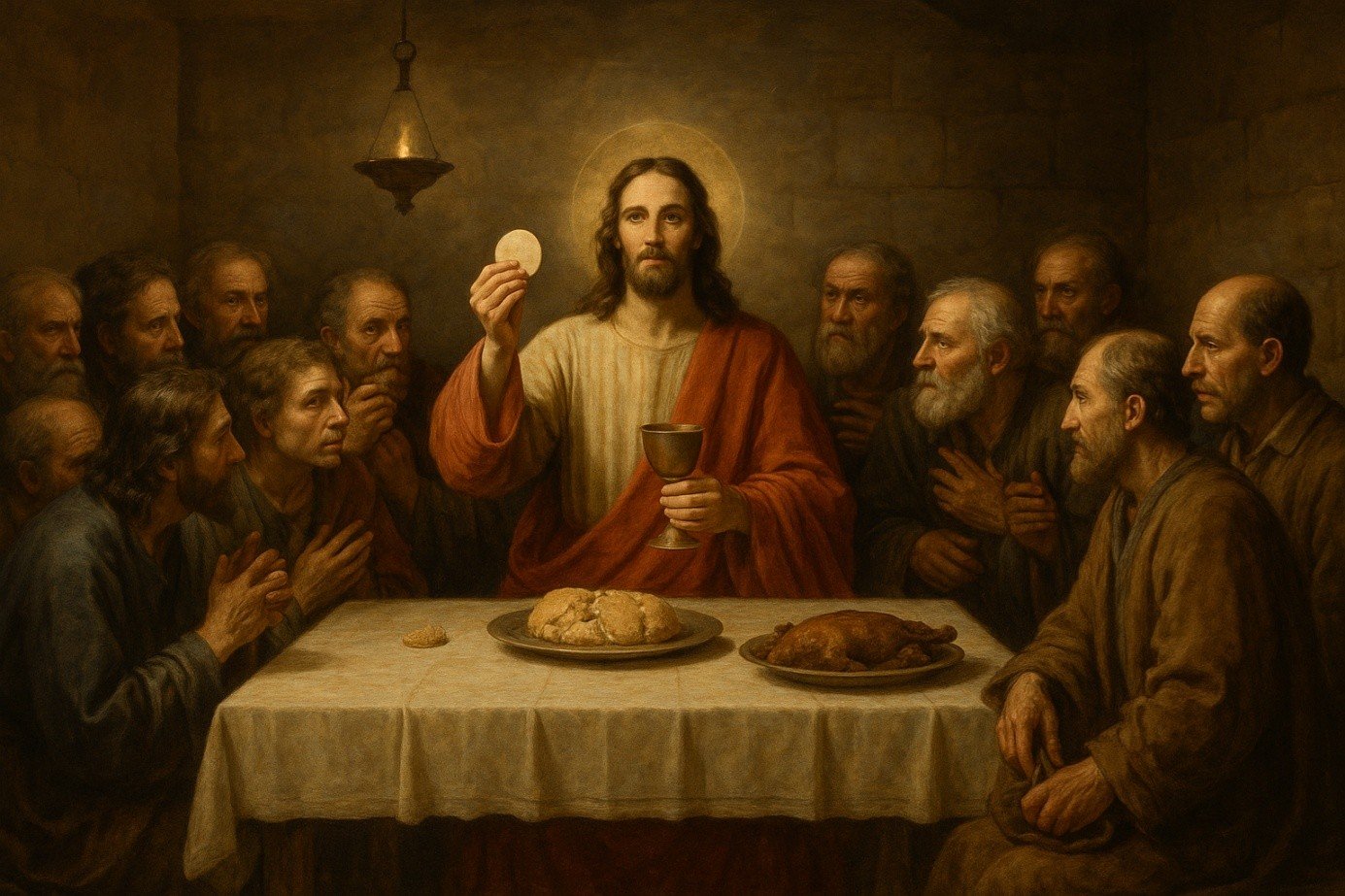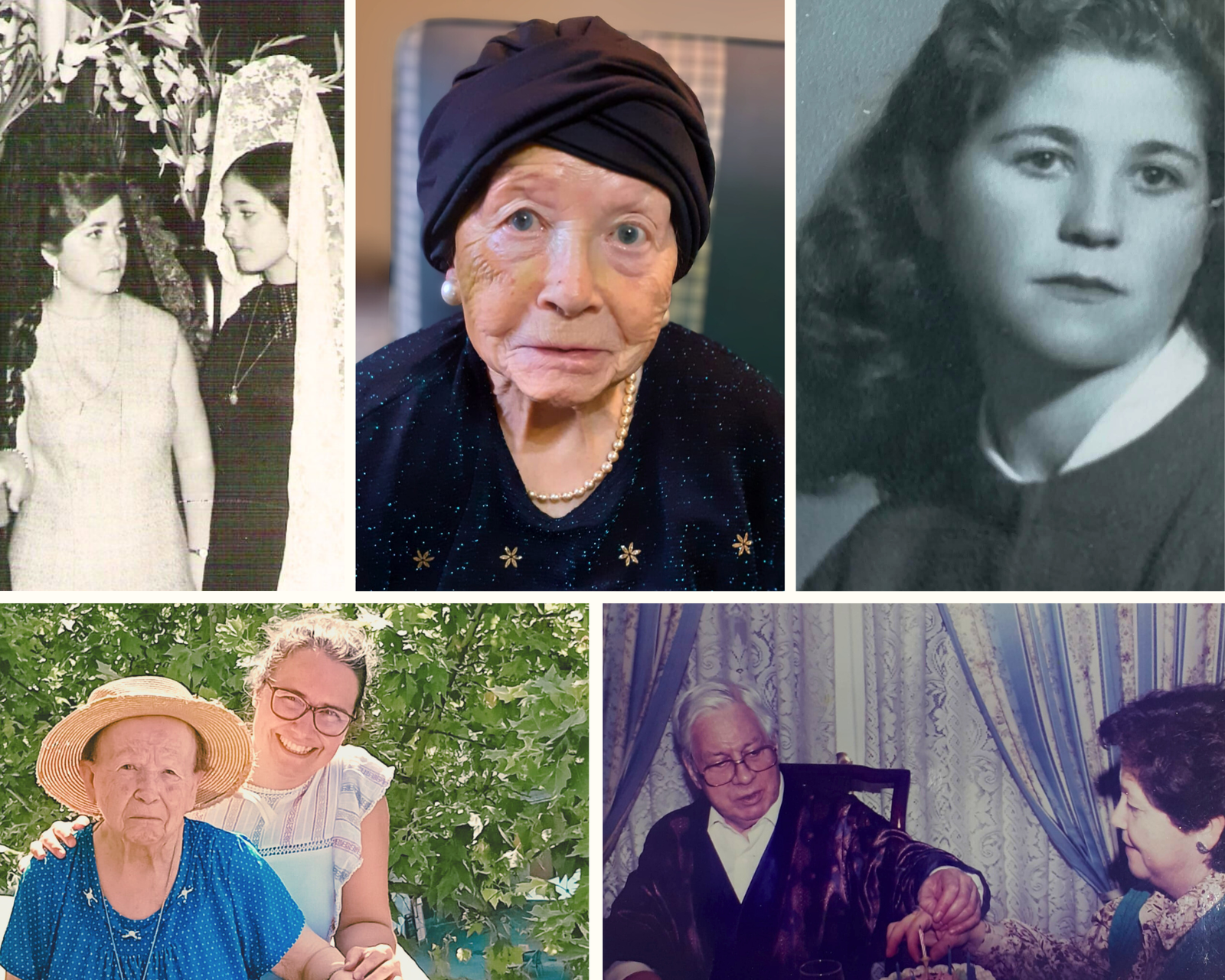
Gospel according to Saint Luke 9:11b-17:
Jesus spoke to the crowds about the kingdom of God, and he healed those who needed to be cured. As the day was drawing to a close, the Twelve approached him and said, “Dismiss the crowd so that they can go to the surrounding villages and farms and find lodging and provisions; for we are in a deserted place here.” He said to them, “Give them some food yourselves.” They replied, “Five loaves and two fish are all we have, unless we ourselves go and buy food for all these people.” Now the men there numbered about five thousand. Then he said to his disciples, “Have them sit down in groups of about fifty.” They did so and made them all sit down. Then taking the five loaves and the two fish, and looking up to heaven, he said the blessing over them, broke them, and gave them to the disciples to set before the crowd. They all ate and were satisfied. And when the leftover fragments were picked up, they filled twelve wicker baskets.
Jesus’ last will
Luis CASASUS President of the Idente Missionaries
Rome, June 22, 2025 | The Most Holy Body and Blood of Christ
Gen 1:18-20; 1Cor 11: 23-26; Lk 9,11b-17
Some people do not bother to meditate on the mystery and reality of the Body and Blood of Christ. Some even try to justify their lack of faith (or minimal interest) by the lack of “scientific evidence,” without realizing that every time a person approaches to receive the Body (and Blood) of Christ, they are declaring themselves—without words—hungry, destitute, and in need of help, which cannot go unanswered by God. It is therefore a repeated experience that validates a hypothesis. Isn’t that scientific? But it certainly happens that those who receive the Blessed Sacrament are part of that experience, which we can best call living experience. And others can see that something has indeed happened in the heart of those who receive the Eucharist. At the very least, their filial awareness is strengthened, their impression that they cannot walk alone, which is a first step toward uniting themselves to Christ, in reality to the three Divine Persons.
Christ himself expresses what happens in this way: Whoever eats my flesh and drinks my blood remains in me and I in him (Jn 6:56).
Some of the most intelligent and sensitive saints take full advantage of the Eucharist to ensure that they do not stray from the path. For example, after being ordained a priest in 1537, St. Ignatius of Loyola waited more than a year before celebrating his first Mass (he did so on Christmas Day, in St. Mary Major Cathedral in Rome) because of his intense desire to prepare himself with the greatest purity of heart and reverence, knowing who was going to be present at that act.
Our Founder, Fernando Rielo, said: “My vocation is to live as a child before the Father, with Christ in the Eucharist, in the Holy Spirit.”
The Eucharist is the greatest spiritual gift for the soul, because it not only communicates grace, it communicates Christ himself. There is no analogy capable of representing this reality, but perhaps a short story will help us not to forget it:
Once upon a time, there was a mango tree full of life and sweetness that loved a little boy with all its being. A silent but deep bond was formed between them, for the boy was happy under its shade, climbing its trunk, swinging from branch to branch, and delighting in its golden fruits.
The days were long, and the game was endless. But time, like the breeze, does not stop. The boy grew up and gradually drifted away. The tree, however, never stopped waiting for him. Even in its silence, it spoke to him:
Come, my little one. Keep climbing my arms, swing your laughter among my branches, eat my fruit, and find joy in my shade.
But the young man was no longer a child. He replied with distant eyes:
I have left games behind. Now I want other things. I want to laugh, yes, but with what money can buy me.
The mango tree, though wounded in its sap, offered its heart:
Take my fruit. Take it with you. Exchange it for a few coins, and be a little happier with them.
And so it was. But the young man returned again and again, not out of nostalgia, but out of necessity. And the tree always gave: it offered its branches for a house, its trunk for a canoe. Each time, it said tenderly:
Take what you need, because my joy is in seeing you smile.
The seasons passed, and the boy grew old. When he returned, the mango tree was nothing more than an old stump, worn down by time and love. Sad, he thought he had nothing left to give.
The old man looked at him with tired eyes and said:
I no longer seek riches or adventures. Just a place to rest. I am tired, my friend.
And the stump, humble and silent, offered itself as a seat.
And there, under a sky of memories, the man sat down. And the tree, though reduced to almost nothing, was immensely happy. For even in its last moments, it could still hold the one it had loved all its life.
—ooOoo—
Today’s Gospel takes place in a deserted place near Bethsaida, after the disciples told Jesus everything they had done (Lk 9:10). This should make us think not only that the Master wanted to convince the apostles that they had the grace to heal and help their neighbors in any situation, but also that they could always give something more, in ways they could not imagine. They could, in fact, give their lives completely. It was also a way of preparing them to understand how in the Eucharist He Himself gives Himself over and over again, in every age and in every place in the world.
The fact that Christ chose this form of presence in the form of food makes us understand that it must be a necessary and repeated encounter, like the act of eating every day.
Archbishop Fulton Sheen recounted that during the Chinese Republican Revolution of 1911, anti-Catholic militants raided a Catholic parish. They placed the parish priest under house arrest. From the window of his rectory, he witnessed the desecration of the church. He knew that there were thirty-two consecrated hosts in the tabernacle.
An eleven-year-old girl was praying in the back of the church, and the guards either did not see her or did not pay attention to her. She returned to the church that night and spent an hour in prayer, then consumed one of the sacred hosts, bowing to receive Jesus on her tongue. She continued to return every night, spending an hour in prayer and consuming a sacred host. On the last night, the thirty-second, unfortunately, a guard woke up after she consumed the Eucharist. He chased her, grabbed her, and beat her to death with his rifle.
Archbishop Fulton Sheen learned of her martyrdom when he was a seminarian. He was so impressed by her sacrifice that he promised to pray a holy hour before the Blessed Sacrament every day for the rest of his life. The eleven-year-old girl could not have imagined how she would influence you and me, and a future bishop who would, in turn, help millions of people and promote Eucharistic adoration. Nor do we have any idea how our humble witness and sacrifices help others, because the strength and courage of what we do for the Kingdom of Heaven is found in Christ, who promised to dwell in us (Jn 14:23).
—ooOoo—
Today’s First Reading, from Paul’s first letter to the Corinthians, is historically very important. This is because Jesus’ words in this passage are the first words of Christ that we have recorded. We know that Jesus’ statements are recorded in the Gospels and other books of the New Testament. But Paul’s letters were written between twenty and fifty years before the Gospels and these other books of the New Testament were written.
Paul begins by telling the people of Corinth that the tradition of celebrating the Lord’s Supper goes back to Jesus Christ himself. For I received from the Lord what I also passed on to you. Paul did not receive this tradition personally from the Master, since he was not one of the twelve apostles present at the Last Supper. He received it from those who were Christians before him, after his conversion to the Christian faith. Now he passes on to the Corinthians the same tradition that he himself received. The only difference is that, while until Paul’s time the tradition was passed on by word of mouth, Paul was the first to put it in writing because he could not be physically with the Corinthians.
The night he was betrayed was the last night Jesus spent with his disciples before his passion and death. In ancient times, people did not write their wills, but expressed them orally, usually as their last words before dying. What do the words of this Letter tell us when we read them as last words, as the testament and will of Jesus?
In reality, he is not speaking of “his teachings,” but of himself. He gave his body to his followers as food and his blood as drink. This took place in the context of the Passover meal. Thus, he presents himself as the Passover lamb. The Israelites in Egypt had to eat the flesh of the Passover lamb to identify themselves as God’s people. They marked the lintels of their doors with its blood as a sign to ward off the angel of death. Seen in this light, the Eucharist becomes for us the place where we come to renew ourselves as the new people of God in Christ. The Master’s instruction that we celebrate this Eucharist, this act of thanksgiving, again and again is more important than pondering other details.
The Eucharist unites us and is a promise that “something new will happen” in those who receive it. It is always something personal; it is not enough to recognize and repeat the sublime truths we have learned in catechesis: there is an intimate union with Christ, the reception of sanctifying grace, the forgiveness of venial sins, consolation, peace, and strength against sin… What is necessary is to be aware that this is a unique moment, like Christ’s farewell in the life of the first disciples, a moment in which he wanted to gather us and give us the most profound part of his life. That is why it is so advisable to keep a few moments of inner silence each time we have received the Body of Christ and have acknowledged that this is so, responding to the mystery: Amen.
May we live with gratitude and joy every time we receive Christ in the Eucharist, so that we can say with the young Carlo Acutis, who will be canonized in a few months: The Eucharist is my highway to Heaven.
_______________________________
In the Sacred Hearts of Jesus, Mary and Joseph,
Luis CASASUS
President












